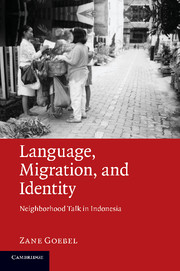Book contents
- Frontmatter
- Contents
- Figures
- Diagrams
- Maps
- Tables
- Extracts
- Preface
- Conventions
- 1 Introduction
- 2 Long-term Processes of Enregisterment
- 3 Enregistering Local Practices and Local Spaces
- 4 Linguistic Signs, Alternation, Crossing, and Adequation
- 5 Women, Narratives, Identity, and Expectations in Ward 8
- 6 Learning to Become a Good Ward Member
- 7 Emerging Identities in a Monthly Ward 8 Male Meeting
- 8 Chineseness as Deviance
- 9 Language Ideologies and Practice in Ward 5
- 10 Conclusions
- Notes
- References
- Index
3 - Enregistering Local Practices and Local Spaces
Published online by Cambridge University Press: 04 August 2010
- Frontmatter
- Contents
- Figures
- Diagrams
- Maps
- Tables
- Extracts
- Preface
- Conventions
- 1 Introduction
- 2 Long-term Processes of Enregisterment
- 3 Enregistering Local Practices and Local Spaces
- 4 Linguistic Signs, Alternation, Crossing, and Adequation
- 5 Women, Narratives, Identity, and Expectations in Ward 8
- 6 Learning to Become a Good Ward Member
- 7 Emerging Identities in a Monthly Ward 8 Male Meeting
- 8 Chineseness as Deviance
- 9 Language Ideologies and Practice in Ward 5
- 10 Conclusions
- Notes
- References
- Index
Summary
Introduction
While the view of semiotic encounters and semiotic register (SR) formation presented thus far recognizes people's agency, we also need to be mindful of the types of processes that enable and constrain access to and participation in the social practices that figure in semiotic register formation. In doing so, this also further enables our aim of going beyond single-instance descriptions of semiotic encounters by linking such constraints with participants' trajectories of socialization. While not specifically focusing on talk, Bourdieu's (1977, 1984, 1990b, 1991, 1994) work provides a useful starting point.
In line with recent linguistic interpretations of his work (e.g. Blackledge & Pavlenko, 2002; Scheuer, 2003), I understand Bourdieu's argument to imply actors' history of participation in or “trajectory” in different “fields” or social settings endows them with certain tastes, dispositions, and rules for the carrying out of their everyday practices, that is, a habitus. As Bourdieu (1994) argues, a person's habitus is not just a product of their own interactions with others but also a product of the often unseen role played by states and institutions. Consider, for example, the role of government departments in the planning and development of residential areas and the subsequent interactional patterns that evolve from these areas. In this sense, we are looking at another aspect of enregisterment processes, namely how different SRs come to contain within their category of signs different types of geographical spaces, persons/groups of people and activities.
Information
- Type
- Chapter
- Information
- Language, Migration, and IdentityNeighborhood Talk in Indonesia, pp. 42 - 57Publisher: Cambridge University PressPrint publication year: 2010
